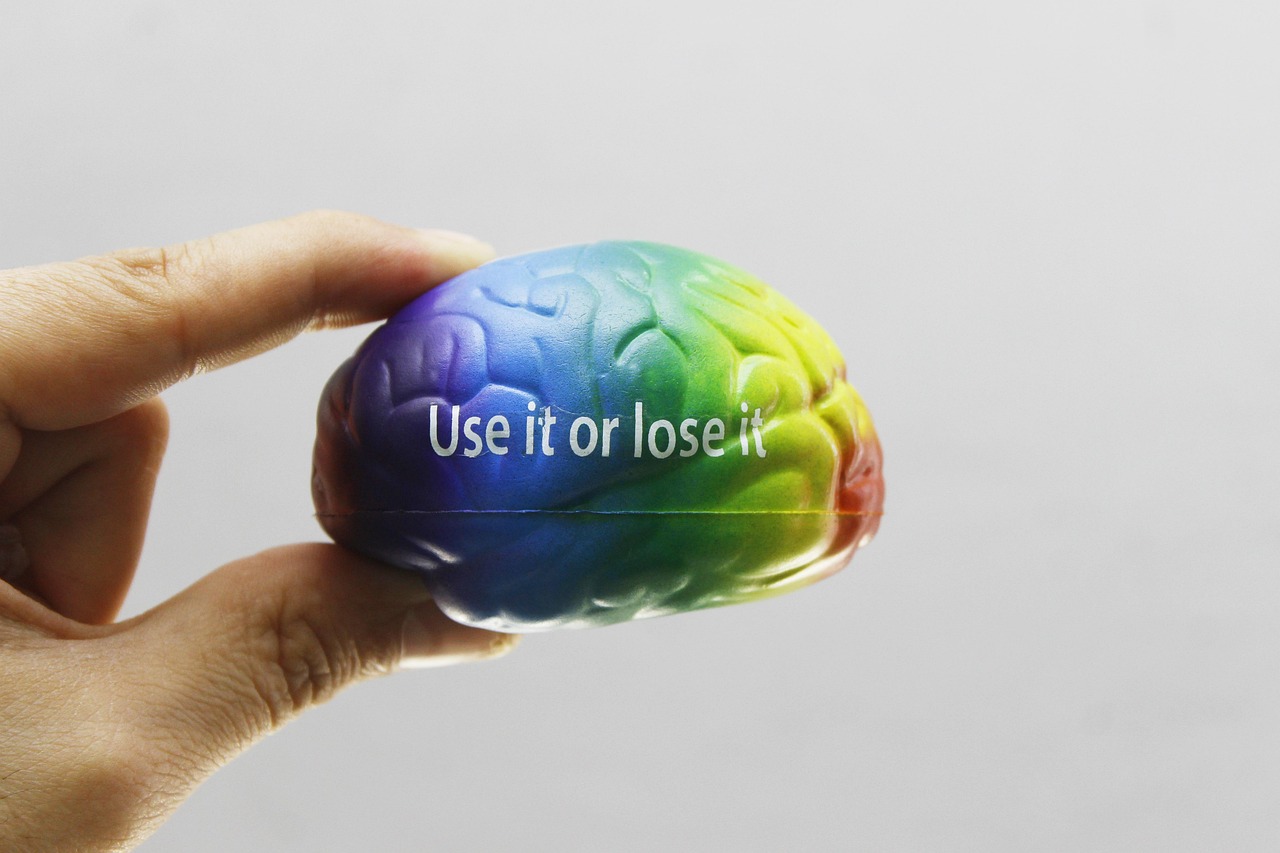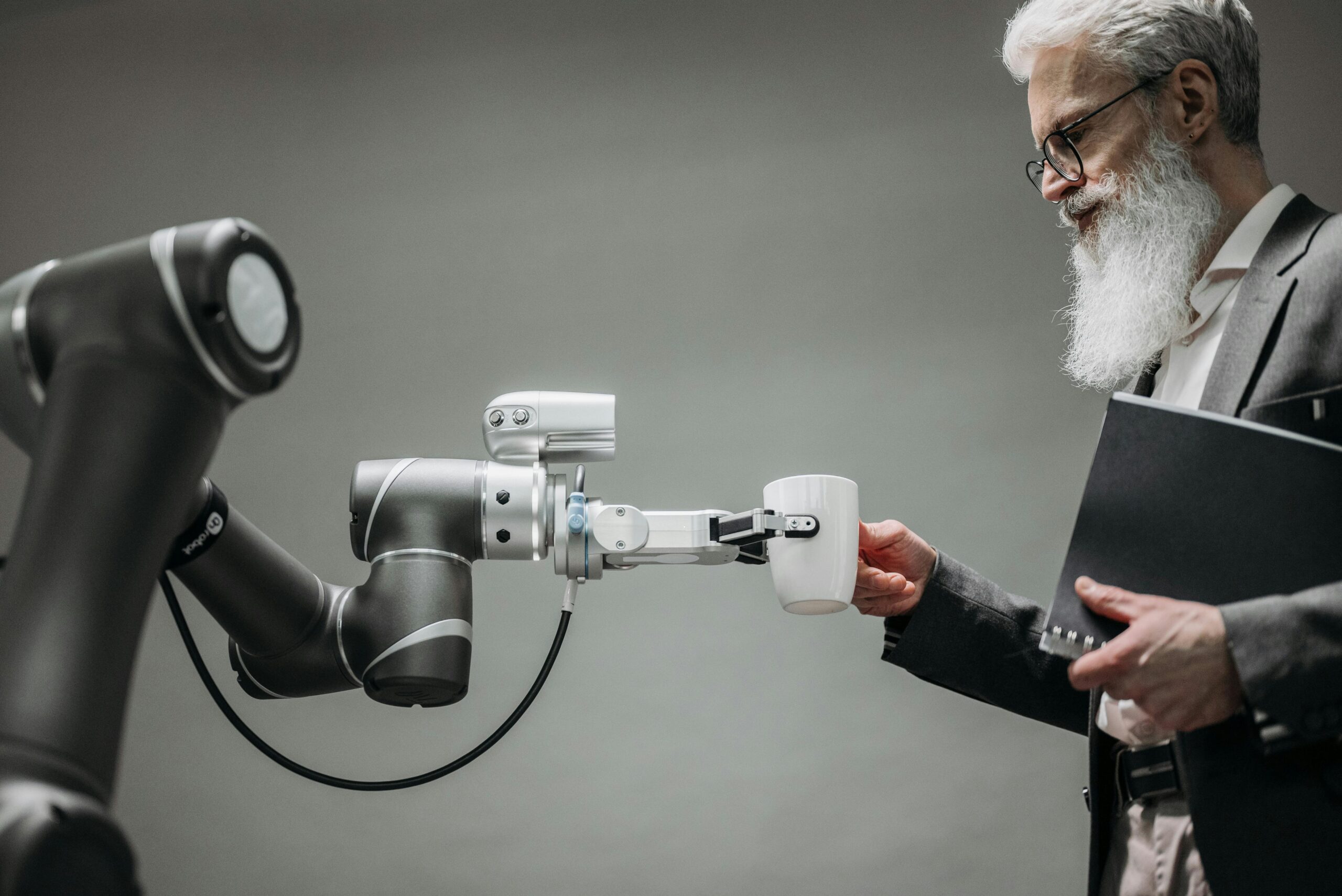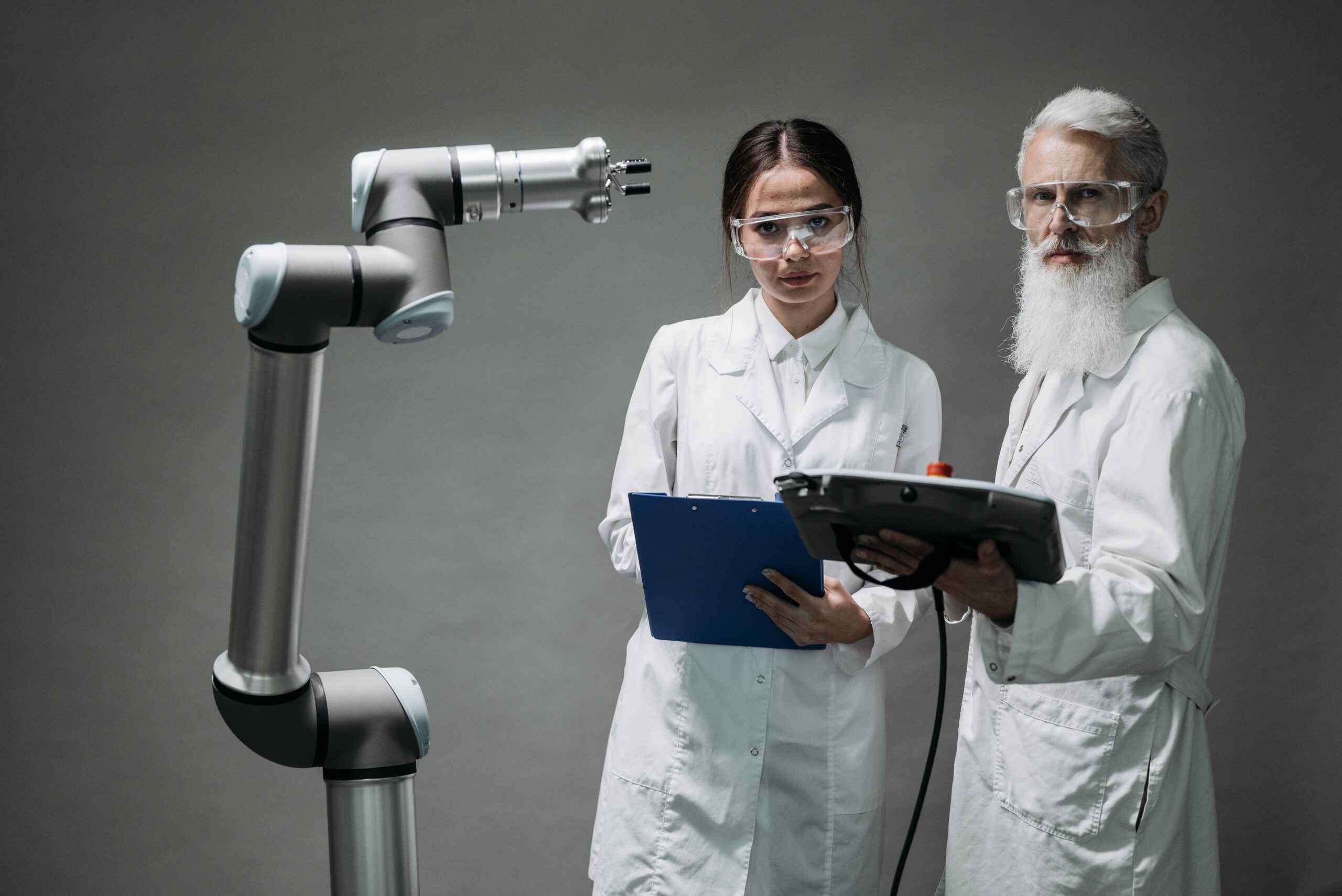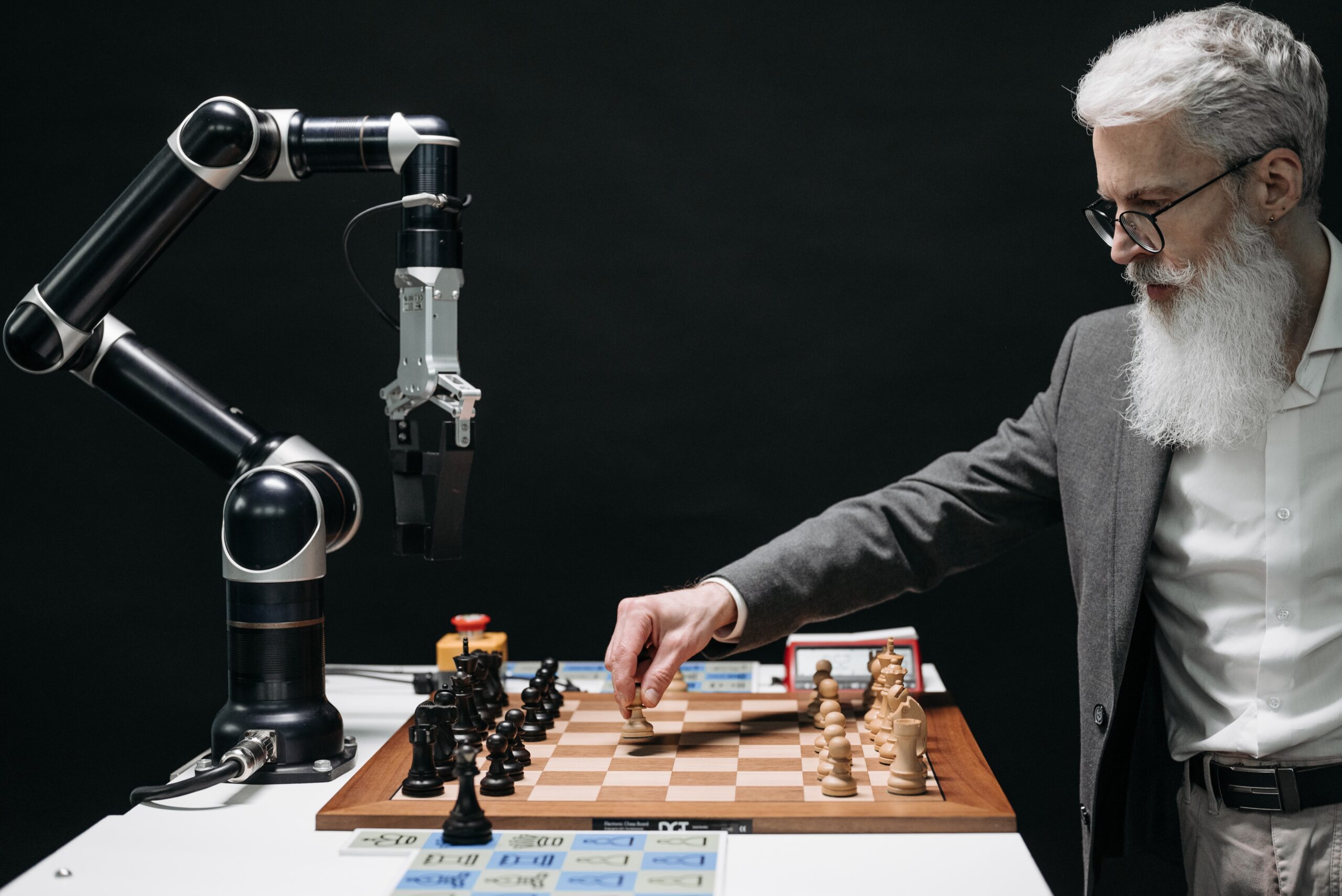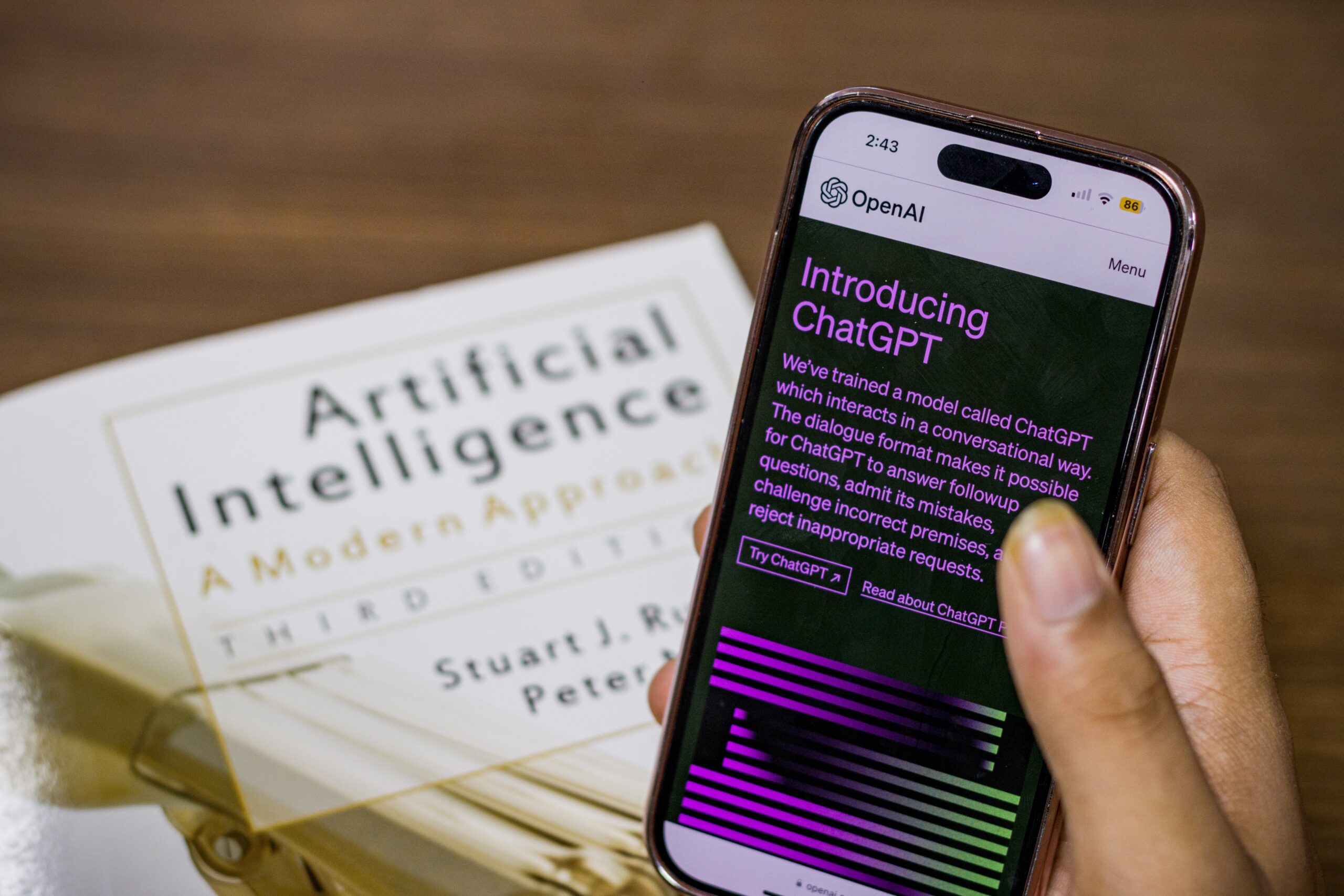
Apr
AI’s Impact On Critical Thinking and Learning – What Studies Are Saying So Far
jerry9789 0 comments artificial intelligence, Burning Questions
Generative AI and Critical Thinking
On our last blog, we touched on two studies suggesting that Generative AI is making us dumber. One of those studies, which was published in the journal Societies, aimed to look deeper into GenAI’s impact on our critical thinking by surveying and interviewing over 600 UK participants of varying age groups and academic backgrounds. The study found “a significant negative correlation between frequent AI tool usage and critical thinking abilities, mediated by increased cognitive offloading.”
Cognitive offloading refers to the utilization of external tools and processes to simplify tasks or optimize productivity. Cognitive offloading has always raised concerns over the perceived decline of certain skills — in this instance, the dulling of one’s critical thinking. In fact, the study found that cognitive offloading was worse with younger participants who demonstrated higher reliance on AI tools and less aptitude when it comes to their own critical thinking skills.
Conversely, participants with higher educational backgrounds showed better command of their critical thinking no matter the degree of AI usage, putting more confidence in their own mental acuity than the AI-based outputs. Aligning with our advocacy for the “appropriate use of AI,” the study emphasizes the importance and appreciation of high-level human thinking over thoughtless and unmitigated adoption of AI technology.
Copyright: jambulboy
Generative AI and Learning
In truth, a number of earlier studies have revealed that the arbitrary adoption of AI tools can be detrimental to one’s ability to learn or develop new skills. A 2024 Wharton study on the impact of OpenAI’s GPT-4 demonstrated that unmitigated deployment of GenAI fostered overreliance on the technology as a “crutch” and led to poor performance when such tools are taken away. The field experiment involved 1,000 high school math students who, following a math lesson, were asked to solve a practice test. They were divided into three groups, with two of these groups having access to ChatGPT while the third had only their class notes. One group of students with ChatGPT performed 48 percent better than those without; however, a follow-up exam without the aid of any laptop or books saw the same students scoring worse by 17 percent than their peers who had only their notes.
What about the second group with the GenAI tutor? They not only performed 127 percent higher than the group without ChatGPT access on the first exam, but they also scored close to the latter during the follow-up exam. The difference? Sometime down the line of their interactions, the first group with ChatGPT access would prompt their AI tutor to divulge the answers, resulting in an increased reliance on GenAI to provide the solutions instead of making use of their own problem-solving abilities. On the other hand, the other group’s AI tutor version was customized to be closer to how real-world and highly effective tutors would interact with students: it would help by giving hints and providing feedback on the learner’s performance, but it would never directly give the answer.
Similar tests with a GenAI tutor in 2023 studied the same issue of AI dependence and the value of careful deployment of AI tools. Khanmigo, a GenAI tutor developed by Khan Academy, was voluntarily tested by Newark elementary school teachers, who belong to the largest public school system in New Jersey. They came back with mixed results, with some complaining that the AI tutor gave away answers, even incorrect ones in some cases, while others appreciated the bot’s usefulness as a “co-teacher.”
Other studies regarding the effectiveness of AI tutors have shown increases in learning and student engagement. These studies have also shown that GenAI can help reduce the time it takes to get through learning materials compared to traditional methods. One study that extolled the benefits of GenAI tutors involved Harvard undergraduates learning physics in 2024, and similar to the third group in the Wharton research, the AI was prevented from directly providing the answer to students. It would guide the student throughout the learning process one step at a time, providing incremental updates of the student’s progress, but never outright telling them the answer. There are merits to the idea of Generative AI as a teaching assistant, but it serves students better when it is positioned to engage one’s attention and abilities rather than induce dependence on it to generate the answers.
Copyright: Only-shot
Can We Use GenAI Without Making Us Dumber?
These studies shed light on how we should approach AI solutions and development, whether the end product is being deployed in learning, productivity or other relevant applications. Beyond thoughtful planning and considerations on how AI tools would be deployed, there should be a focus on engaging the human faculties involved, with safeguards empowering man throughout the entire process instead of letting the machine take over the process wholesale. AI technology is developing rapidly, but we can keep pace and remain reasonable as long as human engagement and empowerment is kept at the core of its utilization and adoption.
Amid contemporary fears that anyone could be replaced anytime by AI, these studies highlight the importance of how vital and interconnected the human factor is to the effective deployment and development of AI tools. One could be content with the constant and consistent output AI tools generate, but progress is only possible when competent human minds are involved in the process and direction. Students can easily find answers with AI tools at their disposal, but why not advance their understanding of how solutions are formed with engaging and relatable AI-powered educational experiences? High-level human thinking grounded by values and experience can’t be replicated by machines, and perhaps there’s no better time than now to incorporate it into the heart of the AI revolution.
While AI development hopes that optimization and automation free the human mind to go after bigger and more creative pursuits, we here at Cascade Strategies simply hope that humanity emerges from all of these advancements more and not less than what it as we entered the AI revolution.
Additional Reading:
Why AI is no substitute for human teachers – Megan Morrone, Axios
AI Tutors Can Work—With the Right Guardrails – Daniel Leonard, Edutopia
Featured Image Copyright: jallen_RTR
Top Image Copyright: danymena88

Sep
So Why Use AI For Your Small Business?
jerry9789 0 comments artificial intelligence, Brand Surveys and Testing, Burning Questions
Artificial Intelligence has actually been around for decades already but it grew past being a buzzword and into the mainstream in 2022 with the surprise popularity of OpenAI’s ChatGPT. Nowadays, it might be challenging to find someone who doesn’t have an iota of an idea of what AI is and what it does. In fact, its widespread cultural adoption belies its real impact behind the scenes where it steadily transforms and shapes businesses and industries towards a more automated and optimized direction.
Now as a small business owner, you might think that last statement doesn’t apply to you and is targeted mostly towards larger scale companies, but that is far from the truth. That last statement is just as relevant to your smaller, local-based trade as it is to any regional or global firm. In fact, 75% of small businesses have taken advantage of AI, according to the Small Business & Entrepreneurship Council. Additionally, 93% of small businesses agree that they save money and improve profitability utilizing AI solutions. We learned about these two interesting points when we attended a webinar hosted by CallRail, “Q&A: Demystifying AI for Small Businesses.”
You might have heard too that AI actually places everybody on the same playing field, and this was underscored at the webinar when they shared that small businesses have access to the same AI technology that big companies employ. At the same time, small businesses are granted a chance to achieve the same impact as their larger counterparts. Small businesses however enjoy being able to adapt or incorporate new technology and processes easier than their larger counterparts.
So how do you join the small businesses using AI to make money and grow? What are examples of AI being utilized by small businesses? Where do you start in understanding and applying AI solutions for your small business?
Artificial Intelligence and Its Subsets
Perhaps it’s best to follow suit with the webinar and include a quick look but fundamental understanding of AI and its subset. As you might know, AI technology enables machines like computer systems to simulate or emulate human intelligence and behavior by learning from training data, pattern recognition, decision-making, and problem-solving.
When that pattern recognition is taken one step further by involving huge data sets and advanced algorithms, a subset of AI called Machine Learning is developed. Aside from simulating or emulating human intelligence, Machine Learning allows computer systems to learn and adapt. However, a misstep in ML is the oversight of certain variables affecting the accuracy of the intended output.
A subset of ML called Deep Learning builds upon this limitation of overlooking variables by actually learning from these variables with historical data to generate accurate and high level outputs. DL achieves this by leveraging multiple layers of artificial neural networks for in-depth data processing and analytical tasks.
And when that high level data set is transformed into generated yet fine-tuned content like text, images, or code, we now arrive in the territory of Generative AI. This subset of DL models include the popular ChatGPT.
How Are Small Businesses Using AI?
Like any other company or industry, small businesses have started to use AI to save time by streamlining, automating and optimizing whichever aspect of their processes that they could. One example is speech-to-text where instead of listening to every call, you convert a recorded phone call into summarized text with relevant and possibly actionable information or insight. By filtering calls in this manner, you’re also able to identify which types require the utmost attention and immediate follow-up, an especially valuable feature for qualifying leads.
As they say time is gold and so in the same vein where you free time by outsourcing time-consuming and repeatable tasks to another person or agency, automating processes through AI allow you to devote the time you free up to other more advanced functions or find more opportunities that can help further improve productivity and profitability, growing your business along the way.
Will AI Replace Small Businesses?
Now adapting and utilizing AI in your small business isn’t the end-all and be-all; it won’t even be replacing you wholesale anytime since it is, after all, just another tool at one’s disposal. Embracing the hot new tech keeps you at pace with the rest of the pack, but how you stand out will still fall on your business savvy and the intrinsic, unique value you bring to the table. Whether it be for your marketing or improving processes or customer relations, AI will help you glean as many insights as possible from your business transactions, interactions, and communications, but how effective that knowledge becomes will still depend on how well you leverage it.

Sep
What It Means to Choose or Decide In The Age of AI
jerry9789 0 comments artificial intelligence, Burning Questions
Longstanding Concerns Over AI
From an open letter endorsed by tech leaders like Elon Musk and Steve Wozniak which proposed a six-month pause on AI development to Henry Kissinger co-writing a book on the pitfalls of unchecked, self-learning machines, it may come as no surprise that AI’s mainstream rise comes with its own share of caution and warnings. But these worries didn’t pop up with the sudden popularity of AI apps like ChatGPT; rather, concerns over AI’s influence have existed decades long before, expressed even by one of its early researchers, Joseph Weizenbaum.
ELIZA
In his book Computer Power and Human Reason: From Judgment to Calculation (1976), Weizenbaum recounted how he gradually transitioned from exalting the advancement of computer technology to a cautionary, philosophical outlook on machines imitating human behavior. As encapsulated in a 1996 review of his book by Amy Stout, Weizenbaum created a natural-language processing system he called ELIZA which is capable of conversing in a human-like fashion. When ELIZA began to be considered by psychiatrists for human therapy and his own secretary interacted with it too personally for Weizenbaum’s comfort, it led him to start pondering philosophically on what would be lost when aspects of humanity are compromised for production and efficiency.
Copyright chenspec (Pixabay)
The Importance of Human Intelligence
Weizenbaum posits that human intelligence can’t be simply measured nor can it be restricted by rationality. Human intelligence isn’t just scientific as it is also artistic and creative. He remarked with the following on what a monopoly of scientific approach would stand for, “We can count, but we are rapidly forgetting how to say what is worth counting and why.”
Weizenbaum’s ambivalence towards computer technology is further supported by the distinction he made between deciding and choosing; a computer can make decisions based on its calculation and programming but it can not ultimately choose since that requires judgment which is capable of factoring in emotions, values, and experience. Choice fundamentally is a human quality. Thus, we shouldn’t leave the most important decisions to be made for us by machines but rather, resolve matters from a perspective of choice and human understanding.
AI and Human Intelligence in Market Research
In the field of market research, AI is being utilized to analyze a multitude of data to produce accurate and actionable results or insights. One such example is deep learning models which, as Health IT Analytics explains, filter data through a cascade of multiple layers. Each successive layer improves its result by using or “learning” from the output of the previous one. This means the more data deep learning models process, the more accurate the results they provide thanks to the continuing refinement of their ability to correlate and connect information.
While you can depend on the accuracy of AI-generated results, Cascade Strategies takes it one step further by applying a high level of human thinking. This allows Cascade Strategies to interpret and unravel insights a machine would’ve otherwise missed because it can only decide, not choose.
Take a look at the market research project we performed for HP to help create a new marketing campaign. As part of our efforts, we chose to employ very perceptive researchers to spend time with worldwide HP engineers as well as engineers from other companies.
This resulted in our researchers discovering that HP engineers showed greater qualities of “mentorship” than other engineers. Yes, conducting their own technical work was important but just as significant for them was the opportunity to impart to others, especially younger people, what they were doing and why what they were doing was important. This deeper level of understanding led the way for a different approach to expressing the meaning of the HP brand for people and ultimately resulted in the award-winning and profitable “Mentor” campaign.
If you’re tired of the hype about AI-generated market research results and would like more thoughtful and original solutions for your brand, choose the high level of intuitive, interpretive, and synthesis-building thinking Cascade Strategies brings to the table. Please visit https://cascadestrategies.com/ to learn more about Cascade Strategies and more examples of our better thinking for clients.

Aug
The Future Is Here
“Mitigating the risk of extinction from AI should be a global priority alongside other societal-scale risks such as pandemics and nuclear war.”
With just 22 words, we are ushered into a future once heralded in science fiction movies and literature of the past, a future our collective consciousness anticipated but has now taken us by surprise upon the realization of our unreadiness. It is a future where machines are intelligent enough to replicate a growing number of significant and specialized tasks. A future where machines are intelligent enough to not only threaten to replace the human workforce but humanity itself.
Published by the San Francisco-based Center for AI Safety, this 22-word statement was co-signed by leading tech figures such as Google DeepMind CEO Demis Hassabis and OpenAI CEO Sam Altman. Both have also expressed calls for caution before, joining the ranks of other tech specialists and executives like Elon Musk and Steve Wozniak.
Earlier in the year, Musk, Wozniak, and other tech leaders and experts endorsed an open letter proposing a six-month halt on AI research and development. The suggested pause is presumed to allow for time to determine and implement AI safety standards and protocols.
Max Tegmark, physicist and AI researcher at the Massachusetts Institute of Technology and co-founder of the Future of Life Institute, once held an optimistic view of the possibilities granted by AI but has now recently issued a warning. He remarked that humanity is failing this new technology’s challenge by rushing into the development and release of AI systems that aren’t fully understood or completely regulated.
Henry Kissinger himself co-wrote a book on the topic. In The Age of AI, Kissinger warned us about AI eventually becoming capable of making conclusions and decisions no human is able to consider or understand. This is a notion made more unsettling when taken into the context of everyday life and warfare.
Working With AI
We at Cascade Strategies wholeheartedly agree with this now emerging consensus and additionally, we believe that we’ve been obedient in upholding the responsible and conscientious use of AI. Not only have we long been advocating for the “Appropriate Use” of AI, but we’ve also made it a hallmark of how we find solutions for our client’s needs with market research and brand management.
Just consider the work we’ve done with the Expedia Group. For years, they’ve utilized a segmentation model to engage with their lodging partners by offering advice that could lead to the partner winning a booking over a competitor. AI filters through the thousands of possible recommendations to arrive at a shortlist of the best selections optimized for revenue.
With the continued growth and diversification of their partners, they then needed a more effective approach in engaging and appealing to them, something that focuses more on that associate’s behavior and motivations. We came up with two things for Expedia: a psychographic segmentation formed into subgroups based on patterns of thinking, feeling, and perceiving to explain and predict behavior, and more importantly, a Scenario Analyzer that utilizes the underlying AI model but now delivers recommendations in very action-oriented and compelling messaging tailor-fit for that specific partner.
The best part about the Scenario Analyzer is whether the partner follows any of the advice recommended or does nothing, Expedia still stands to make a profit while maintaining an image of personalized attentiveness to their partner’s needs. And ultimately, it’s the partner who gets to decide, not the AI.

Copyright Tara Winstead
Our Future With AI
This is how we view and approach AI- it’s not the end-all, be-all solution but rather an essential tool in increasing productivity and efficiency in tandem with excellent human thinking, judgment, and creativity. Yes, it is going to be part of our future but in line with the new consensus, we believe that AI shaped by human values and experience is the way to go with this emerging and exciting technology.

Aug
The Impact of AI
In The Age of AI, which Henry Kissinger co-wrote with Eric Schmidt and Daniel Huttenlocher, Kissinger tried to warn us that AI would eventually have the capability to come up with conclusions or decisions that no human is able to consider or understand. Put another way, self-learning AI would become capable of making decisions beyond what humans programmed into it and base such conclusions on what it deems the most logical approach, regardless of how negative or devastating the consequences can be.
A common example to illustrate this point is how AI had already transformed games of strategy like chess, where given the chance to learn the game for itself instead of using plays programmed into it by the best human chess masters, it executed moves that have never crossed the human mind. And when playing with other computers that were limited by human-based strategies, the self-learning AI proved dominant.
When applied to the field of warfare, this could possibly mean AI proposing or even executing the most inhumane of plans regardless of human disagreement simply because it considers such a decision the most logical step to take.
The Influence of AI
As part of Kissinger’s warning, it’s been noted just how far-reaching AI’s influence already is in modern life, especially with its usage in innocuous things such as social media algorithms, grammar checkers, and the much-hyped ChatGPT. With the growing dependency on AI, there runs the risk of human thinking being eclipsed by machine-based efficiency and effectiveness. And how it arrives at such efficient and effective decisions becomes questionable because it could become difficult or near impossible to trace what it has learned along the way.
Just imagine someone making a decision influenced by the information fed to them by AI and yet failing to rationalize the thinking behind such a decision. That particular human may not realize it, but at that point they’re living in an AI world, where human decision-making is imitating machine decision-making rather than the reverse. It was this interchangeability Alan Turing was referring to with his famous postulate about artificial intelligence — the so-called “Turing Test” — which holds that you haven’t reached anything that can be fairly called AI until you can’t tell the difference.
Copyright Pavel Danilyuk
Appropriate Use of AI
However, it’s been pointed out that the book doesn’t follow “AI fatalism,” a common belief wherein AI is inevitable and humans are powerless to affect this inevitability. The authors wrote that we are still capable of controlling and shaping AI with our human values, its “appropriate use” as we at Cascade Strategies have been advocating for quite some time. We have the opportunity to limit or restrain what AI learns or align its decision-making with human values.
Kissinger had sounded the warning while others had already made calls to start limiting AI’s capabilities. We are hopeful that in the coming years, with the best modern thinkers and tech experts at the forefront, we progress to more of an AI-assisted world where human agency remains paramount instead of an AI-dominated world where inscrutable decisions are left up to the machines.

Jul
What To Make Of ChatGPT’s User Growth Decline
jerry9789 0 comments artificial intelligence, Burning Questions, Uncategorized
The Beginning Of The End?
More than six months after launching on November 2022, ChatGPT recorded its first decline in user growth and traffic in June 2023. Spiceworks reported that the Washington Post surmised quality issues and summer breaks from schools could have been factors in the decline, aside from multiple companies banning employees from using ChatGPT professionally.
Brad Rudisail, another Spiceworks writer, opined that a subset of curious visitors driven by the hype over ChatGPT could’ve also boosted the numbers of early visits, the dwindling user growth resulting from the said group moving on to the next talk of the town.
The same article also brings up open-source AI gaining ground on OpenAI’s territory as a possible factor, thanks to customizable, faster, and more useful models on top of being more transparent and the decreased likelihood of cognitive biases.
Don’t Buy Into The Hype
But perhaps the best takeaway is Mr. Rudisail’s point that we’re still in the early stages of AI and it’s premature to herald ChatGPT’s downfall with a weak signal like decreased user growth. For all we know, this is what could be considered normal numbers, with earlier figures inflated by the excitement surrounding its launch. Don’t buy into the hype is a position we at Cascade Strategies advocate when it comes to matters of AI.
The advent of AI has taken productivity and efficiency to levels never seen before, so the initial hoopla over it is understandable. However, we believe people are now starting to become a little more settled in their appraisal of AI. They’re starting to see that AI is pretty good at “middle functions” requiring intelligence, whether that be human or machine-based. But when it comes to “higher function” tasks which involve discernment, abstraction and creativity, AI output falls short of excellence. Sometimes mediocrity is acceptable, but for most pursuits excellence is needed.
Excellence Achieved Through High Level Human Thinking
To illustrate just how AI would come out lacking in certain activities, let’s consider our case study for the Gargoyles brand of sunglasses. ChatGPT can produce a large number of ads for sunglasses at little or no cost, but most of those ads won’t bring anything new to the table or resonate with the audience.
However, when researchers spent time with the most loyal customers of Gargoyles to come up with a new ad, they discovered a commonality that AI simply did not have the power to discern. They found a unique quality of indomitability among these brand loyalists: many of them had been struck down somewhere in their upward striving, and they found the strength and resolve to keep going while the odds were clearly against them. They kept going and prevailed. The researchers were tireless in their pursuit of this rare trait, and they stretched the interpretive, intuitive, and synthesis-building capacities of their right brains to find it. Stretching further, they inspired creative teams to produce the award-winning “storyline of life” campaign for the Gargoyles brand.
All told, this is a story of seeking excellence, where hard-working humans press the ordinary capacities of their intellects to higher layers of understanding of a subject matter, not settling for simply a summarization of the aggregate human experience on the topic. This is what excellence is all about, and AI is not prepared to do it. To achieve it, humans have to have a strong desire to go beyond the mediocre. They have to believe that stretching their brains to this level results in something good.
How To Make “Appropriate Use” of AI
But that is not to say that AI and high level human thinking can’t mix. The key is to recognize where AI would best fit in your process and methodologies, then decide where human intervention comes in. This is what we call “Appropriate Use” of AI.
Take for example our case study for Expedia Group and how they engage with millions of hospitality partners. Expedia offers their partner “advice” which helps them receive a booking over their competitors. With thousands of pieces of advice to give their partners, they utilize AI to filter through all those recommendations and present only the best ones to optimize revenue. Cascade Strategies has helped them further by creating a tool called Scenario Analyzer, which uses the underlying AI model to automate the selection of these most revenue-optimal pieces of advice.
Either way, the end decision on which advice to go with (or whether they accept any advice at all) ultimately still comes from Expedia’s partner, not the AI.
Copyright ClaudeAI.uk
A Double-edged Sword
As you can see with ChatGPT, it’s easy to get carried away with all the hype surrounding AI. At launch, it was acclaimed for the exciting possibilities it represented, but now that it has hit a bump in the road, some people and outlets act as if ChatGPT is on its last leg. Hype is good when it’s necessary to draw attention; unfortunately in most cases, it sets up the loftiest of expectations when good sense gets overridden.
This is why we think a sensible mindset is the best way to approach and think about AI — to see it for what it really is. It’s a tool for increasing productivity and efficiency, not the end-all and be-all, as there is still much room for excellent human thinking backed by experience and values to come into play. Our concerns for now may not be as profound and dire as those expressed by James Cameron, Elon Musk, Steve Wozniak and others, but we’d like to believe that “appropriate use” of AI is the key towards better understanding and responsible stewardship of this emerging new technology.

Jun
How Great Research Produces Great Campaigns
jerry9789 0 comments artificial intelligence, Brand Surveys and Testing, Brandview World, Burning Questions
Can AI Produce Your Marketing Campaign?
If you were given the task of developing a global communications campaign for a technical products company, would you let ChatGPT do it?
 You might, especially if you noted that ChatGPT could churn out dozens of ads like the one above without paying art directors, copywriters, media professionals, or users of a Demand Side Platform.
You might, especially if you noted that ChatGPT could churn out dozens of ads like the one above without paying art directors, copywriters, media professionals, or users of a Demand Side Platform.
But we wouldn’t. This is because it’s hard for AI to produce at the level of excellence, and excellence is what should be sought.
Seeking Excellence in Marketing Campaigns
The ad below is part of an award-winning and profitable “Mentor” campaign for HP. To arrive at this level, HP had to commission very perceptive researchers to spend time with worldwide HP engineers as well as engineers from other companies.
The researchers stretched the intuitive, interpretive, and synthesis-building capacities of their right brains to arrive at a subtle insight that AI would have great difficulty seeing: that HP engineers showed greater qualities of “mentorship” than other engineers. They thought it was important not only to conduct their own technical work, but to impart to others (typically younger people) what they were doing and why what they were doing was important.
It would be very hard indeed to stretch an AI chatbot (or other AI engine) to that deeper level of understanding about what a truly extraordinary ad should do to express the true meaning of a brand to people.
An example from the world of sunglasses
If you were given the job of developing a campaign for a line of sunglasses, you could probably get ChatGPT to produce a large number of ads like the following at little or no cost (with the exception of the cost of the talent).
 But AI-produced ads fall short of excellence. AI simply cannot do the incisive interpretive work that humans can do to produce something better.
But AI-produced ads fall short of excellence. AI simply cannot do the incisive interpretive work that humans can do to produce something better.
Researchers working for the Gargoyles brand of sunglasses spent time with those who preferred this brand and made a discovery about them that AI engines would have great difficulty seeing: that many Gargoyles wearers were upward strivers who were at first destined to fail, then turned things around with drive, verve, and strenuous effort.
 They had a “storyline of life” worth admiring. To gain this insight, the researchers had to stretch the intuitive and interpretive powers of their brains. They could not simply rely on a summarization of prior human experience in producing ads about sunglasses.
They had a “storyline of life” worth admiring. To gain this insight, the researchers had to stretch the intuitive and interpretive powers of their brains. They could not simply rely on a summarization of prior human experience in producing ads about sunglasses.
Higher powers AI cannot reach
AI cannot stretch to this level of excellence. It cannot see broader levels of human experience that may be required to produce excellence, such as “how could sunglasses have anything to do with striving?” or “how could a life story of struggling ever be associated with sunglasses?” Hell, generative AI wouldn’t even think to inquire about a storyline of life. But humans can do that when their right brains are performing at a very high level.
The researchers in this case had to sweat the details a little more, spend quality time pondering the higher thematic levels, and drive their brains well beyond summarization to a more sublime expression of the true meaning of a brand to people.
This is the kind of work Cascade Strategies does on a daily basis. Please have a look at some other examples of higher thinking for clients at https://cascadestrategies.com.
People are catching on and speaking out
More people are seeing the chasm between the summarization of human experience that AI can provide and the excellence provided by the greater intuitive powers of the human brain, and they are speaking out about it. One example is Po-Shen Loh, a charismatic math coach who directly confronts AI, challenging his students to attack complex math problems at higher levels of understanding and interpretation than AI could ever provide.
But there are even more people who are discovering this excellence gap, and their voices will grow stronger.



